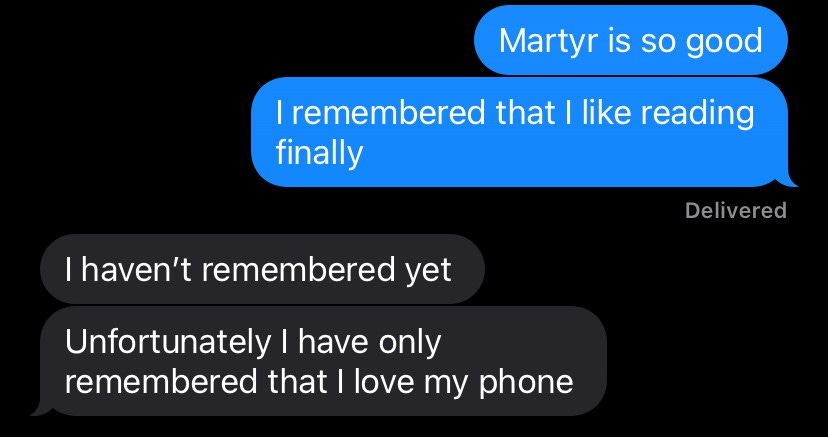I didn’t read a single book in April. I was just burnt out; as you might have been able to tell, I was doing waaay too much over the winter, between writing classes, my new job, car problems, housing changes, and yoga and dance classes. It was beautiful - I had zero free seconds to devote to sadness or anxiety - but I felt guilty all the time for not picking up any books all month.
In May I had this idea to only read books with yellow covers, because I love a theme. As you’ll see, I sort of stuck to that. I also wanted to read this book on community organization, but it just wasn’t relevant or enjoyable once I finished the first section and realized the rest was an instruction manual for people whose job is being hired to intervene and organize communities.
Anyways, here you go: my reviews! See you again next month!
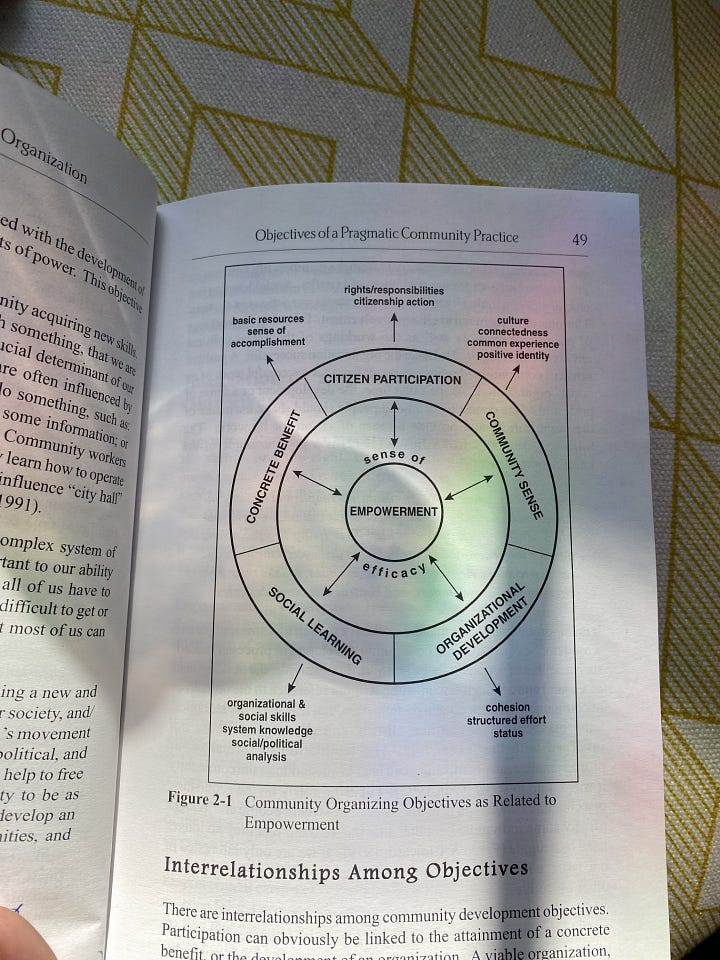
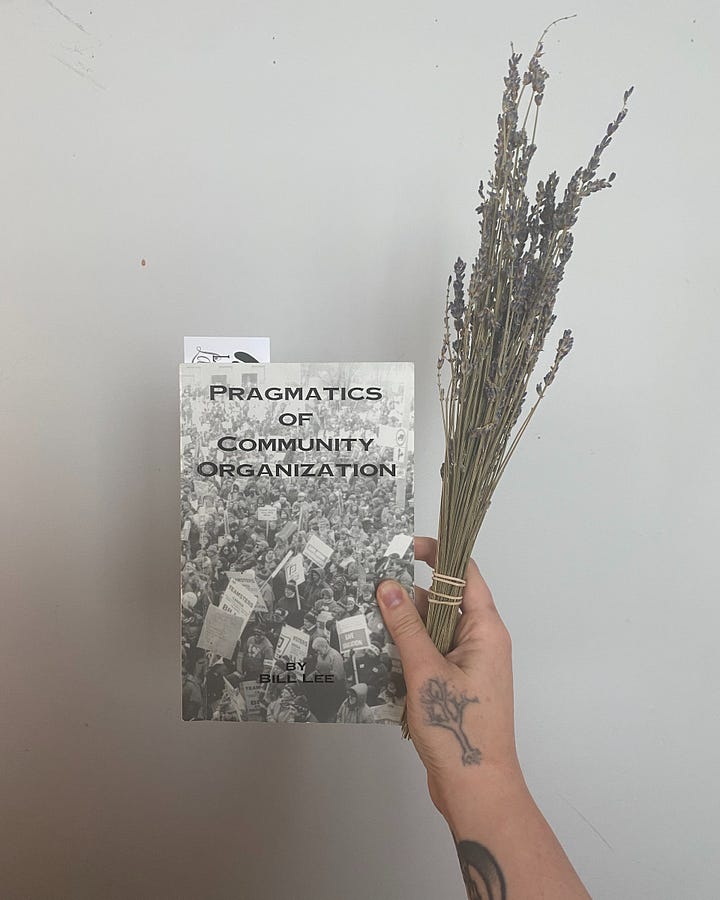
Politics
Pragmatics of Community Organization by Bill Lee (1999)
I didn’t finish this book, because in the second section it became a textbook that was irrelevant to me unless I was actively working as an intervening community organizer (and seeking advice on, say, balancing the desires of the sponsoring body with the perspectives of the community in which I was intervening). But I read the first section and couldn’t put it down. It contains invaluable, foundational insights on why it matters for a citizenry to be engaged; or, as Lee puts it, to feel “efficacy” and “empowerment.” Lee breaks the objectives of a pragmatic community practice into five objectives: citizen involvement, sense of community, organization development, concrete benefits, and social learning. If you have any interest in community engagement, or in changing something in your environment, it’s a fantastic and practical perspective.
People who are organized and become effective in rendering their environment relatively more malleable are more likely to perceive themselves differently, as subjects not objects, as people who develop a vision of a better world […] and who can act coherently to achieve it. The organizing endeavour can be seen as the process of bringing people together to share their experiences, create a vision, and develop means to act and attain that vision.
Lee, Pragmatics of Community Organization (I can’t find the fucking page but it’s in section one)
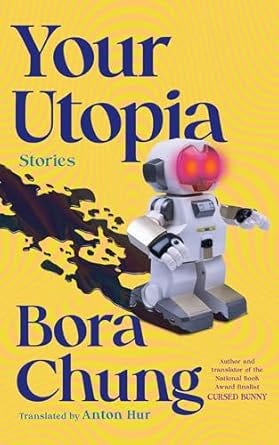

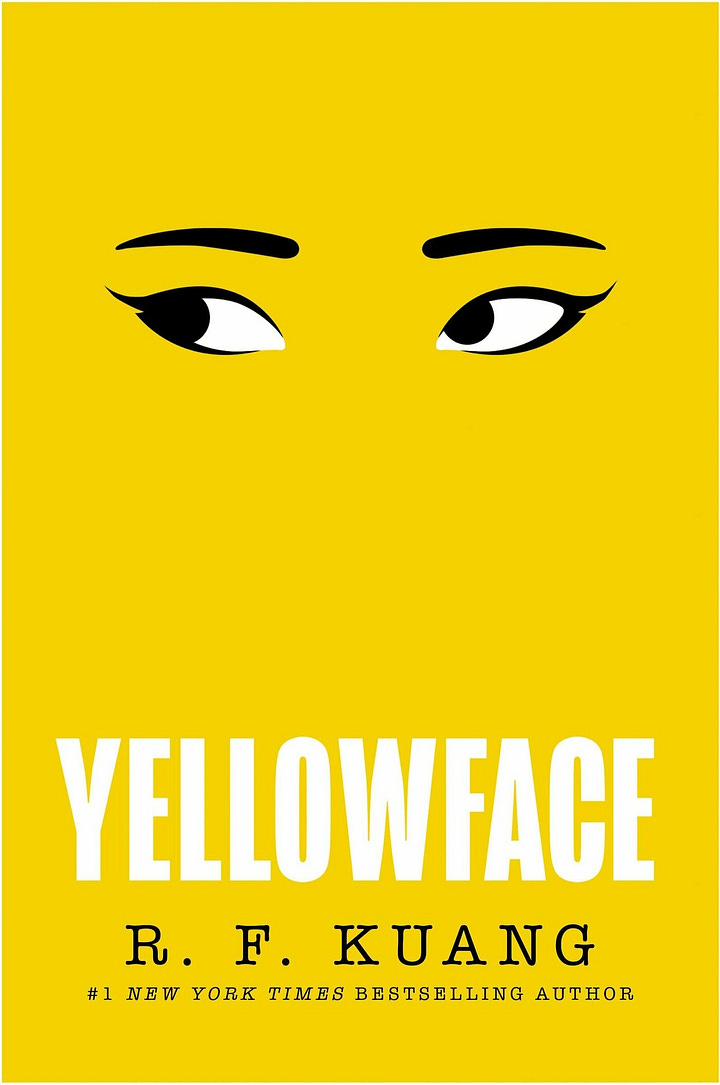
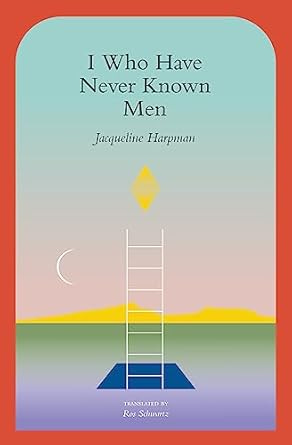
Literary
Yellowface by R.F. Kuang (2023)
323 pages, read in a week
previously read by Kuang: Babel, The Poppy War
2.5 undercooked pancakes out of 5
I think Kuang’s books are fantastic resources for young readers, because she pulls off morally hideous characters so completely that the reader is forced, kicking and screaming, into critical thinking about the narrator. I would give her work to high schoolers and undergrads so that they get a clear, accessible example of how to evaluate a character’s motivations. June is sympathetic at times, but her choices demonstrate her conniving centre. In a world of uncomplicated, placeholder YA protagonists, Kuang is a crucial counterpoint.
My low-ish rating is because I just don’t enjoy reading it. Once you understand the schtick, Yellowface is just as grim as The Poppy War. And I don’t mean to undermine the importance of the political messaging in these texts. I’m just saying that from an entertainment perspective, the books are a slog. They’re not supposed to be cheery, obviously. But they’re not nasty like Moshfegh either; beyond the shaky morality of the protagonist, they fall short of delivering any gripping imagery or prose, memorable characters or settings, or even intriguing moral dilemmas. They’re doomed from the start, and if you already have critical thinking skills and leftist politics, the book is predictable and depressing.
Your Utopia: Stories by Bora Chung, trans. Anton Hur (2021)
242 pages, read in 1.5 weeks
previously read by Chung: Cursed Bunny
4 pollens out of 5
Speculative feminist sci-fi/fantasy is so back!!! Your Utopia is a fresh, confident story collection, with everything from a Kafkaesque story about a company selling “immortality elixir” to Chung’s take on a Transformers-style sentient car chase. My favourite was “Seed,” an environmentalist, anti-Monsanto piece about hybrid tree people protecting their forest. This collection was a bit more even than Cursed Bunny - none of the highs quite as ambitious or memorable as “The Head,” but none of the lows quite as low. There is a strange node in each story that Chung jumps off of to deliver prescient commentary, and that makes it successful sci-fi to me.
Martyr! by Kaveh Akbar (2024)
331 pages, read in 1-2 weeks
3 pissed beds out of 5
This book was engrossing, but it left something to be desired imo. The dream conversations between the likes of the protagonist’s deceased mother and Lisa Simpson were quirky, irreverent, and insightful. The Marina Abramovic-esque artist character was interesting. And the absolute highlight, for me, was the romance between the two leads; the scene where Cyrus’s foot is injured affected me deeply. Don’t we all dream of everything falling into place with our best friend, after years of queer pining and ride-or-die friendship?
What I struggled with was the prose. It’s very plain and at times awkward. I felt that the figurative language missed more than it hit. I like the idea of simple prose complementing the technicolour, magically realistic quality to Martyr!, but I think overall it falls short - surprising when the author is such a talented poet.
I Who Have Never Known Men by Jacqueline Harpman (1995)
201 pages, read in a week
4 bunkers out of 5
This text is a significant achievement in feminist speculative fiction, as it delves deep into what makes a person a “woman” or a “girl,” an individual or a community member. It has a serious, introspective tone, and it generally quiet and observational rather than flashy and imaginative. It’s timeless and touching. I think that the simplicity could have used a little more… something, like a touch more conflict or, say, sequences using more metaphor and general interaction with the landscape. Like I would have loved to see the women find an animal and disagree over what to do. Not that I think the women would have devolved into Lord of the Flies, but a little more development of side characters, a little more clashing of philosophies, would have been interesting.
<3





